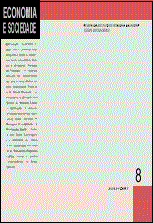Resumo
Este trabalho versa sobre os aspectos econômicos de um elemento universalmente presente na produção, o conhecimento. Identificam-se, inicialmente, algumas de suas características que tornam difícil a sua mercantilização. Diferenciando-o de informação, arrolam-se traços adicionais, em especial o fato de não ser inteiramente transmissível, de ter forte caráter tácito. Além disso, é cumulativo e “caminho-dependente”. Quanto à sua capacidade de gerar rendimentos, o texto propõe que ela não se prenda à sua venda, mas à sua capacidade de criar diferenças inimitáveis, permitindo a geração de quase-rendas. Por fim, arrolam-se as principais formas de aprendizado e comenta-se a necessidade de se criar formas eficientes de esquecimento.
Abstract
This article is about economic characteristics of something that is always present in any process of production: knowledge. At the beginning we try to enumerate some of its features which are responsible for its non-marketability. Then we argue about its differences from information, including the fact that it is to a certain extent tacit and non-transmissible. Besides it is also cumulative and path-dependent. Because of all these facts, one would not expect that the revenues originated by its trade are high enough to stimulate its production. It is suggested that it is a source of quasi-rents, as it creates unreplicable differences among economic agents. Finally, we comment some forms of learning and the fact that society must find efficient forms of destroying obsolete knowledge.
Key-words: Knowledge – Appropriability. Economic features. Learning – Economic role
Referências
ARROW, K. Economic welfare and the allocation of resources for invention. The rate and direction of inventive activity. Princeton: Princeton Univ. Press, 1962a.
________. The economic implications of learning by doing. Review of Economic Studies, v. 29, p. 155-73, 1962b.
AUERBACH, P. Competition: the economics of industrial change. Oxford: Basil Blackwell, 1988.
CANUTO, O. Mudança técnica e concorrência: um arcabouço evolucionista. Campinas: UNICAMP. IE, 1992. (Texto para Discussão, n. 6).
DASGUPTA, P.; STIGLITZ, J. . Industrial structure and the nature of innovative activity. Economic Journal, v. 90, n. 358, p. 266-93, jun. 1980.
________; STONEMAN, P. Introduction. In: ________; ________,ed. Economic policy and technological performance. Cambridge, Engl.: Cambridge Univ. Press, 1987.
DOSI, G. Technical change and industrial transformation. London: Macmillan, 1984.
________. Sources, procedures and microeconomic effects of innovation. Journal of Economic Literature, v. 26, n.3, p.1120-71, 1988.
________. The contribution of economic theory to the understanding of a knowledgebased economy. Laxenburg, Austria: IIASA, 1995. (Working Papers, 95-56).
FREEMAN, C. The economics of industrial innovation. Harmondsworth: Penguin, 1974.
HAYEK, F. (1978). Competition as a discovery procedure. In: WITT, U., org. Evolutionary economics. Aldershot: E. Elgar, 1993. p.399-410.
INGRAO, B.; ISRAEL, G. The invisible hand. Cambridge, Mass.: MIT Press, 1990.
JOHNSON, B. Institutional learning. In: LUNDVALL, B., org. National systems of innovation. London: Pinter, 1992. p. 23-44.
KNIGHT, F. (1921). Risco, incerteza e lucro. Rio de Janeiro: Expressão e Cultura, 1972.
LUNDVALL, B. Innovation as an interactive process: from user-producer interaction to the national system of innovation. In: DOSI, G. et al., org. Technical change and economic theory. London: Pinters Publishers, 1988. p. 349-69.
MARSHALL, A. (1890). Principles of economics. 8th. ed. London: Macmillan, 1986.
MARX, K. (1894). O capital, livro III. Rio de Janeiro: Civilização Brasileira, 1974.
NELSON, R.; WINTER, S. An evolutionary theory of economic change. Cambridge, Mass.: The Belknap Press of Harvard Univ. Press, 1982.
PAVITT, K. Sectoral patterns of technical change: towards a taxonomy and a theory. Research Policy, v. 13, n.6, p.343-73, 1984.
________. Some foundations for a theory of the large innovating firm. In: DOSI et al., ed.
Technology and enterprise in a historical perspective. Oxford: Clarendon Press, 1992. p.185-211.
POLANYI, M. Personal knowledge. Chicago: Univ. of Chicago Press, 1958.
________. The tacit dimension. London: Routledge Kegan & Paul, 1966.
POSSAS, M. Dinâmica e concorrência capitalista: uma interpretação a partir de Marx. São Paulo: Hucitec, 1989.
POSSAS, S. Concorrência e competitividade. notas sobre estratégia e dinâmica seletiva na economia capitalista. Campinas: UNICAMP. IE, 1993. (Tese de Doutorado).
________. Notas acerca da lógica de decisão e expansão da firma capitalista. Campinas: UNICAMP. IE, 1995. (Texto para Discussão, n. 52) RICHARDSON, G. Information and investment. Oxford: Oxford Univ. Press, 1960.
________. The organisation of industry. Economic Journal, v. 82, n. 327, p.883-96, 1972.
ROSENBERG, N. Inside the black box - Technology and economics. New York: Cambridge Univ. Press, 1982.
SCHUMPETER, J. (1912). Teoria do desenvolvimento econômico. São Paulo: Abril Cultural, 1983. (Os Economistas).
________. Capitalism, socialism and democracy. London: Allen & Unwin, 1943.
STIGLITZ, J. Learning to learn, localized learning and technological progress In: DASGUPTA, P.; STONEMAN, P., ed. Economic policy and technological performance. Cambridge, Engl.: Cambridge Univ. Press, 1987. p.125-53.
SMITH, A. (1776). A riqueza das nações: investigação sobre sua natureza e suas causas. São Paulo: Abril Cultural, 1983. (Os Economistas).
A Economia e Sociedade utiliza a licença do Creative Commons (CC), preservando assim, a integridade dos artigos em ambiente de acesso aberto.

